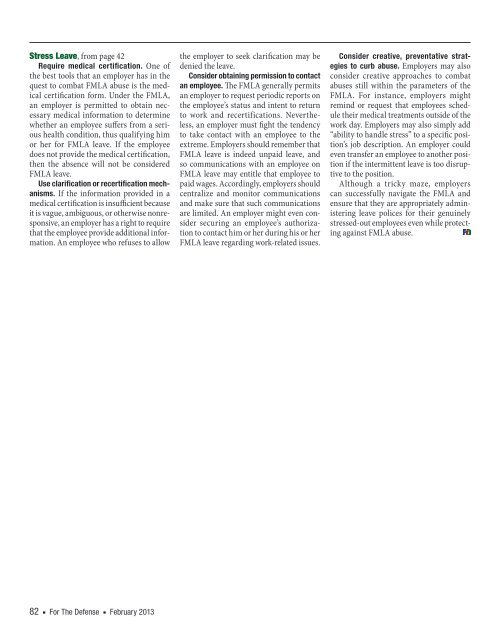Stress Leave Under the FMLA - Greenberg Traurig LLP
Stress Leave Under the FMLA - Greenberg Traurig LLP
Stress Leave Under the FMLA - Greenberg Traurig LLP
You also want an ePaper? Increase the reach of your titles
YUMPU automatically turns print PDFs into web optimized ePapers that Google loves.
<strong>Stress</strong> <strong>Leave</strong>, from page 42<br />
Require medical certification. One of<br />
<strong>the</strong> best tools that an employer has in <strong>the</strong><br />
quest to combat <strong>FMLA</strong> abuse is <strong>the</strong> medical<br />
certification form. <strong>Under</strong> <strong>the</strong> <strong>FMLA</strong>,<br />
an employer is permitted to obtain necessary<br />
medical information to determine<br />
whe<strong>the</strong>r an employee suffers from a serious<br />
health condition, thus qualifying him<br />
or her for <strong>FMLA</strong> leave. If <strong>the</strong> employee<br />
does not provide <strong>the</strong> medical certification,<br />
<strong>the</strong>n <strong>the</strong> absence will not be considered<br />
<strong>FMLA</strong> leave.<br />
Use clarification or recertification mechanisms.<br />
If <strong>the</strong> information provided in a<br />
medical certification is insufficient because<br />
it is vague, ambiguous, or o<strong>the</strong>rwise nonresponsive,<br />
an employer has a right to require<br />
that <strong>the</strong> employee provide additional information.<br />
An employee who refuses to allow<br />
<strong>the</strong> employer to seek clarification may be<br />
denied <strong>the</strong> leave.<br />
Consider obtaining permission to contact<br />
an employee. The <strong>FMLA</strong> generally permits<br />
an employer to request periodic reports on<br />
<strong>the</strong> employee’s status and intent to return<br />
to work and recertifications. Never<strong>the</strong>less,<br />
an employer must fight <strong>the</strong> tendency<br />
to take contact with an employee to <strong>the</strong><br />
extreme. Employers should remember that<br />
<strong>FMLA</strong> leave is indeed unpaid leave, and<br />
so communications with an employee on<br />
<strong>FMLA</strong> leave may entitle that employee to<br />
paid wages. Accordingly, employers should<br />
centralize and monitor communications<br />
and make sure that such communications<br />
are limited. An employer might even consider<br />
securing an employee’s authorization<br />
to contact him or her during his or her<br />
<strong>FMLA</strong> leave regarding work- related issues.<br />
Consider creative, preventative strategies<br />
to curb abuse. Employers may also<br />
consider creative approaches to combat<br />
abuses still within <strong>the</strong> parameters of <strong>the</strong><br />
<strong>FMLA</strong>. For instance, employers might<br />
remind or request that employees schedule<br />
<strong>the</strong>ir medical treatments outside of <strong>the</strong><br />
work day. Employers may also simply add<br />
“ability to handle stress” to a specific position’s<br />
job description. An employer could<br />
even transfer an employee to ano<strong>the</strong>r position<br />
if <strong>the</strong> intermittent leave is too disruptive<br />
to <strong>the</strong> position.<br />
Although a tricky maze, employers<br />
can successfully navigate <strong>the</strong> <strong>FMLA</strong> and<br />
ensure that <strong>the</strong>y are appropriately administering<br />
leave polices for <strong>the</strong>ir genuinely<br />
stressed-out employees even while protecting<br />
against <strong>FMLA</strong> abuse.<br />
82 ■ For The Defense ■ February 2013

















